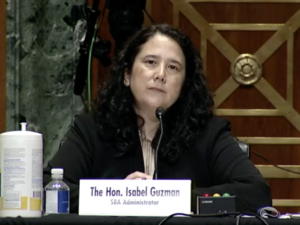
For our coverage of Women’s Small Business Week, Louisville Business First asked Lisa Bajorinas, executive director of Kentucky Innovation Hubs and program director of the Vogt Awards, several questions about the landscape for female founders and entrepreneurs in Kentucky.
Below is what Bajorinas had to say in emailed responses. Answers may have been edited for brevity or clarity.
To what extent have you seen an increase of women founders in Kentucky since the pandemic/post-pandemic?
Since the pandemic, Kentucky has seen an increase in women founders launching concepts and new startup ventures. The number of businesses owned by women is increasing at a rate of 1.5 times the national average and many of those businesses are started by people of color and veterans.
In Kentucky, 40.6% of businesses, almost 148,000 in total, are owned by women. These businesses are creating jobs and fueling the economy. According to the 2022 Kentucky Small Business Profile from the [Small Business Administration] Office of Advocacy, women-owned businesses account for 48% of the jobs in the commonwealth.
What would you attribute that increase to?
During the pandemic, many women were forced to leave their traditional jobs to care for their families when childcare centers closed, and schools went to NTI (non-traditional instruction), resulting largely in mothers stepping up to fill the gap. Given these circumstances, women needed more flexible work arrangements to support their families. Many women have turned to entrepreneurship to follow their passion, gain flexibility, and/or take control of their future and their earning power.
The commonwealth has also seen an increase in women-focused entrepreneurial support programs — for example, Aviatra Accelerators in Northern Kentucky and the Wild Accelerator in Louisville.
What are some challenges specific to female founders that male founders may not encounter?
According to Harvard Business Review, women-led startups received just 2.3% of [venture capital] funding in 2020, and that is after a decline of 0.5% since 2019. PitchBook data suggests that the pandemic made investors more wary of risks and more likely to stick to their existing networks — which is very much a “boys’ club” and tougher for women to break into.
Many investors stick with “pattern-matching habits,” seeking the same kinds of companies that they’ve supported in the past, which is comfortable for them, and which are often tech companies led by men.
Fewer childcare centers, rising costs of childcare and less childcare options have had a profound impact since the pandemic with women disproportionately affected by this issue.
[Another challenge is] a lack of enough female mentors — those women who have successfully, and not successfully, led scalable, venture-backable startups to positive exits who are willing to coach and mentor other female founders while sharing their experiences (the good, the bad and the ugly).
How would you summarize the overall climate in the state of Kentucky for female founders?
Kentucky’s overall climate for female founders is improving. There’s increased awareness of the challenges noted above, more call to action to improve our support of female founders, all of which is boosted by Kentucky ranking high for its women-led startup survival rate (PitchBook reports a 79.1% startup survival rate), despite the challenges noted.
What steps does the state need to take to create a more welcoming and prosperous environment for female founders?
Networking programs help women build connections necessary for the growth and success of their companies. Accelerator programs and incubators that focus on women provide mentorship and networking that benefit women entrepreneurs.
Kentucky needs more female investors and would benefit from women-led investment funds. With more women creating venture funds to encourage female entrepreneurs at the earliest stages of their journeys, more deals are being done at the top of the funnel — the earliest startup stages — where the amount of capital invested is the smallest.
But that early financing can make all the difference between hitting key milestones and failing to launch.










